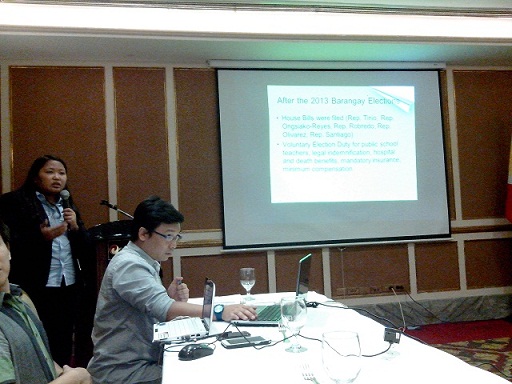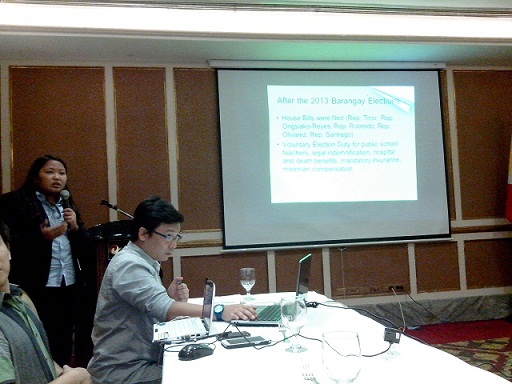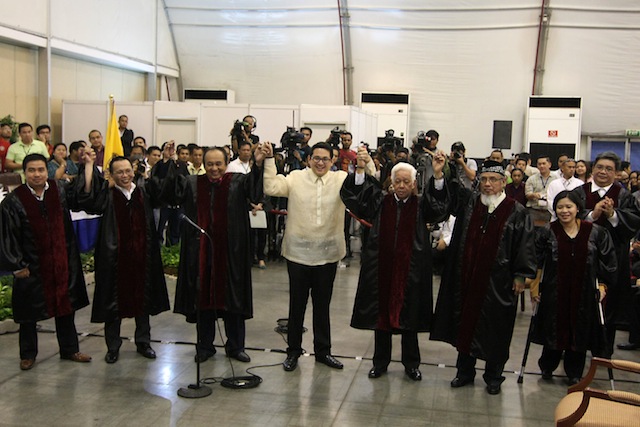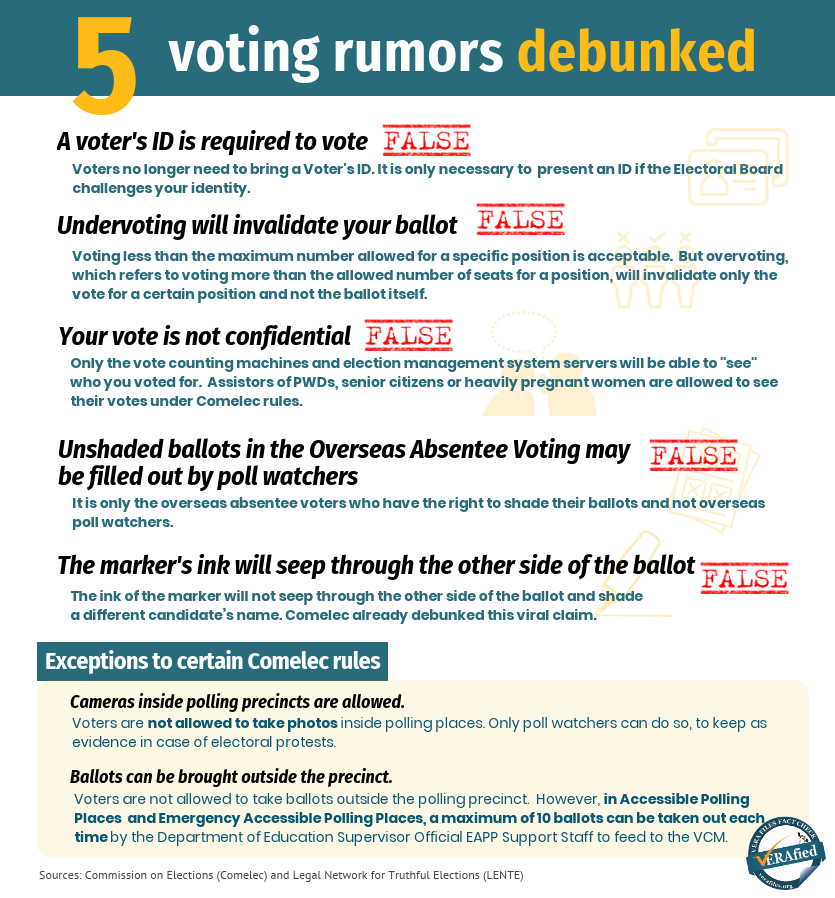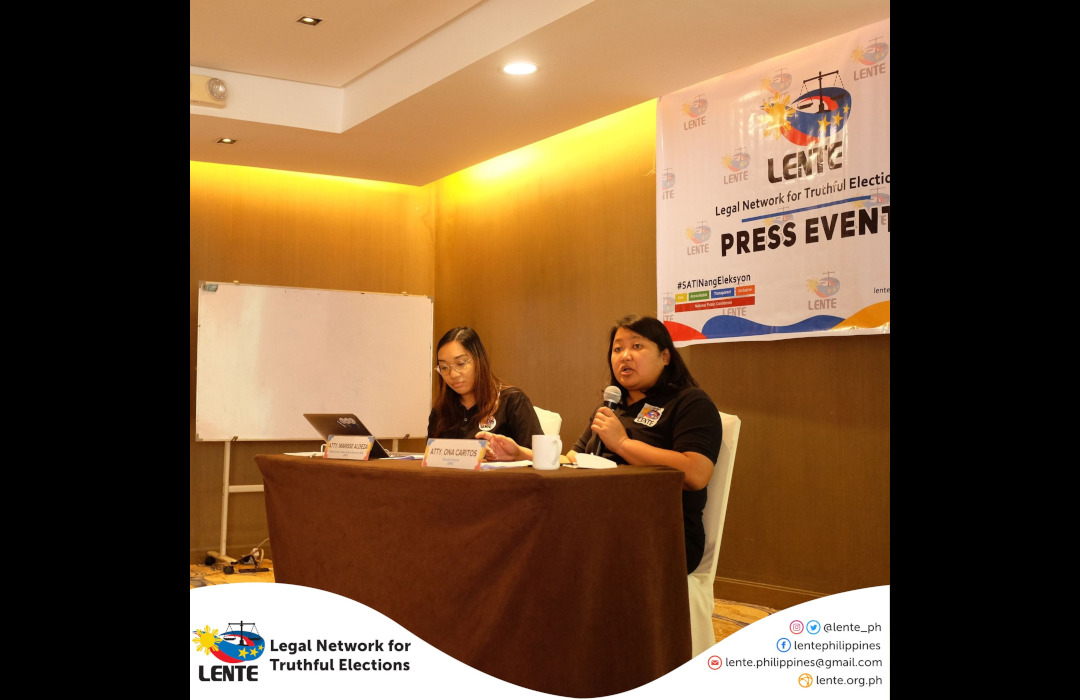ELECTION duties should include non- public school teachers and Persons with Disabilities (PWD), poll watchdog The Legal Network for Truthful Elections (LENTE) recommended based on a study it conducted during the 2013 barangay elections.
In a presentation Wednesday of “Project Teacher,” LENTE said during the October 28, 2013 barangay elections, various election officers actually appointed non-teachers to the Board of Election Tellers (BETs), a three-person team tasked to carry out the voting process in polling precincts nationwide.
LENTE volunteers monitored the conduct of elections in 20 precincts across the country to compare the performance of BETs made up of teachers with those with a non-teacher volunteer serving as third member. Both groups carried out the voting process properly, the group said.
“Having non-public school teachers render election service does not affect the outcome of the elections,” said Atty. Ona Caritos, LENTE acting executive director.
Comelec Resolution 9751 states that “The BET shall be composed of a Chairman and two (2) members, all of whom shall be public school teachers, giving preference to those with permanent appointments and those who served in the May 13, 2013 Synchronized National, Local and ARMM Elections as members of the Board of Election Inspectors (BEIs), unless otherwise disqualified to serve under Sec. 5 hereof.
“In case there are not enough public school teachers, teachers in private schools, employees in the civil service, or other citizens of known probity and competence who are registered voters of the city/municipality may be appointed for election duty.”
Caritos said LENTE is pushing for the inclusion of at least one PWD as member of the Special Board of Election Tellers in every Accessible Polling Places (APPs).
APPs are special precincts created for PWDs, located at the ground floor of voting centers. Several APPs were set up in pilot areas during the 2013 senatorial and local elections, and are set for national implementation for the 2016 presidential elections.
“They (PWDs) know the needs of the sector,” Caritos said.
Caritos expressed her disappointment when a BET chairman in General Santos City reportedly refused a wheelchair user from serving as third member on election day, citing that he would be “a burden” to the poll duties.
Rogelio Sanchez from the National Council for Disability Affairs (NCDA) denounced the “discrimination” adding that “Given the proper training, PWDs can also fulfill the task of election tellers, “he said.
“Maraming highly-competent and qualified people with disabilities,” he said.
Maureen Mata of the group Katipunan ng mga Maykapansanan sa Pilipinas (KAMPI) suggested PWDs could instead render service as poll clerks rather than as third members, because the latter often stands as runner for errands during Election Day.
The findings of “Project Teacher” will be used to support pending bills in Congress making election duty voluntary to public school teachers. Five pending bills at the House of Representatives seek to make election service non-compulsory for public school teachers, and authorize other qualified citizens to become members of the BET.
The bills allow teachers to refuse to serve as BETs during elections for health, age and security reasons, and are now pending at the House Committee on Suffrage and Electoral Reforms.
Priority for the selection of BETs is given as follows: private school teachers, national government employees, members of civil society and non-government organizations, and individuals “of known probity and competence.”
In case there are no other volunteers available, however, Comelec may oblige public school teachers to render service.
Caritos said BET chairpersons should still be public school teachers, given their years of experience in the conduct of elections.
Other benefits proposed are legal assistance for teachers who would be involved in election cases, medical assistance and death benefits.
The bill also provides for higher honoraria for BETs, setting the minimum amount of P6,000 for chairpersons and P5,000 for poll clerks and third members.
Benjo Basas, chairperson of Teacher Dignity Coalition, said reforms to the election law are much needed, as Comelec does not provide enough security measures for teachers despite their service, resulting to harassment and even death of some BETs in the past elections.
“Habang ganito yung ating election laws, laging kawawa ang ating mga teacher (Until these election laws remain, teachers will always be in a pitiful state),” he said.
Basas said teachers have a high sense of patriotism and “Pustahan po tayo, yung mga teacher ay naroon pa rin sa frontline ng election service kahit maging voluntary man itong election duty na ito. (My bet: teachers will remain at the frontline of election service even if it becomes voluntary.)”
